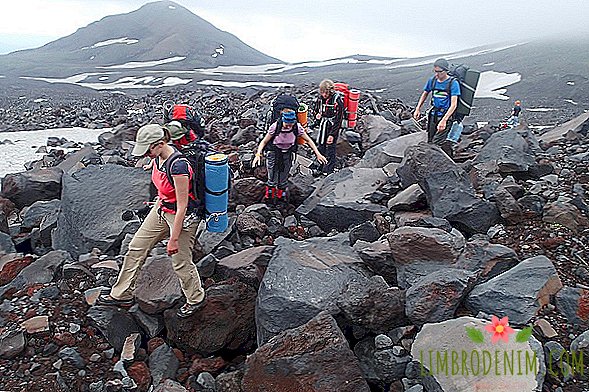Hike across Kamchatka: 160 kilometers on foot and ascent to one volcano
I stand in front of a huge showcase of trekking shoes in the AlpIndustry store and remember the movie “Wild.” Good shoes - this is important, without them, the campaign can not be in any way. This is more or less the only thing I know. "When do you leave?" - the sales assistant strictly asks me? "In a week," I reply, looking at his frowning face. Bad - boots need to be at least a month apart. In fact, I'm lying, leaving me the next day, and I just started to get ready. Borrow a backpack from an ex-boyfriend, a tent from a friend’s friend, find an old jacket on the mezzanine, a fleece from my mother in the garage, buy a tent in Decathlon, and look for a bottle of whiskey in Petropavlovsk. It seems everything. “You can’t take your heels with you,” joked colleagues who know about my love for inappropriate clothing.


Everything looks as if I delayed the departure to the last: I do not sleep the night before, I am going at the moment when the taxi is already waiting at the door, I arrive at the airport close to the end of check-in and have a miracle on the flight. The turmoil of Moscow life, the irrepressible drive and the desire to do everything and everywhere with me will be just a few more days. But this is only for the better - the brighter is the contrast with the peace and tranquility of Kamchatka.
Actually, I was going there not for tranquility, but for adventure. It all started in February. In Moscow, there was a classic nasty weather, at work a hell of a blockage, feelings of discord. I was sitting in front of the computer, leafing through Facebook and suddenly I saw someone's repost ads. "A journey that you can only dream of," "where Russia begins," "where the birthplace of volcanoes." Kamchatka, August 2015. Until August, as well as before Kamchatka, it was so far away that this whole undertaking seemed unreal at all, I cannot plan well in advance, and in general, it would be possible to survive February! It was easy to flip through the tape, but I still managed to catch the very first feeling that arises when you see some new cool opportunity: yes, this is it, I want to do it, and I am sure that it will be cool.
I immediately wrote a message to Asa, the organizer of the group on Facebook. Asya answered within a minute and said that there were no places. "Well, that means not it," I thought, and returned to reality, but with a slightly squeezing feeling in my chest. And after a couple of weeks, Asya wrote again and said that they are doing an additional group, in which there are two last places. And if I say yes right now, then they are mine. I didn't think much. There were two places, so I immediately entered with me for the company of my friend Grisha, who usually supports all my crazy ideas. “It will change our whole life, agree,” I was already after the fact persuading Grisha, “it will be fun!” And not deceived.



The idea of going to the edge of the world, in the complete absence of civilization with complete strangers, fascinated me rather than scared me.

Asya literally organized the whole trip herself, so the trip was very budget. A two-week transition with meals (buckwheat, oatmeal, macaroni, stew, halva, kozinaki and other trekking delicacies) cost us 21,000 rubles. The most expensive is the tickets to Petropavlovsk. Usually they cost about 45,000, but we were lucky to get into the Aeroflot share, so we got tickets for 17,000. Plus, minor expenses for a couple of days in the city and money to buy Kamchatka souvenirs. The Kamchatka guide Maxim helped us with the organization on the spot, someone who recommended Asya back in Moscow. Maxim took over all the logistics, rental cars for the transfer, the purchase of products, study of the route. Honestly, he did a lot of things not in the most optimal way, but we forgave him everything because he found our guide Alexey for us. If it were not for Lyosha, we would never have reached anywhere. Lesha is a man with a terrific temper and an amazing destiny, wherever life has never thrown him. The whole trip he carried on himself all the hardest things, with humor helped everyone who got tired on the way, showed us super unique secret places with which they usually didn’t acquaint tourists, drank alcohol with us around the fire and generally treated hikes not like work , but as a favorite thing.
The route, originally developed by Maxim, was canceled literally a couple of days before the trip, as the weather in this region was badly deteriorated. So we didn’t even know where we were going. In Petropavlovsk, we were met by a car, took us to the Pacific for a day, and from there we got to the Avachinsky volcano, where our hiking route began. Having overcome the Avachinsky Pass, we came to the Nalychevo Valley, to the central cordon, where we established a base camp for a couple of days. From there it was convenient to walk to Talovskiye sources and to the waterfall on the Dzenzur volcano. Our way back went to the Semenovskiy cordon through the Pinachevsky Pass (there, by the way, there is a living cow, so our journey ended with a huge canister of fresh milk).
The idea of going to the edge of the world, in the complete absence of civilization with complete strangers, fascinated me rather than scared me. Although many of my friends twisted their fingers at their heads and just in case asked again: "Do you understand exactly that you will have to live in a tent for two weeks? Sleep on the ground, eat canned meat? Do not wash in the shower, walk with a huge backpack? This is a hike, baby , there it’s impossible to just call Uber and go home when you get tired of it. " "Naive," I thought, "difficulties only attract me." In fact, I already had some ideas about camp life. Last year I went canoeing in Karelia, so I knew about the basic principles of life in nature. But, of course, the hike cannot be compared with anything else. Going for 12-13 hours with a huge 80-liter backpack through glaciers, windbreaks, over rocks, lava - this is quite a strong test of endurance. And both physical and emotional.


The first shock came to me on the very first day of the hike itself. We were going in the morning for a long time, distributed all the products, loaded our backpacks and finally went out. The sun was shining, there was still a wide road ahead, we had fun taking pictures for memory and went forward together. 10 minutes after the start of the journey, we stopped at the station MSCH to check in on the route (in general, all groups must register before the hike), took off their backpacks and looked at each other. In the eyes of everyone, there really was horror. The first 500 meters were so difficult for us that it seemed incredible that we could walk 20 kilometers in one day, and even along a narrow path full of obstacles. The fear passed fairly quickly - each new step was given easier for us, the strength was added, and by the end of the day even the obstacles stopped scaring us.
In fact, we are incredibly lucky with the team. When you spend 14 days side by side with the same people, you often find out more about them than about your friends or colleagues in your daily life. The character of a person is manifested in difficulties - this is a well-known fact, and it was all the more joyful to realize that we were not mistaken in choosing each other. People who decided to go to Kamchatka for 14 days, a priori, cannot be mediocre, but we had a particularly cool mix. Friendliness, responsibility, a positive attitude and, most importantly, a wonderful sense of humor of the most active participants in the hike helped us a lot to make friends, we still write each other every day. Most of the guys were Muscovites, there was still a super class couple from Nizhnevartovsk and excellent guys from Minsk. Plus Lesha, our Kamchatka guide, who during the journey became almost all of us a relative. In total we were 16 people.
One of the most difficult moments was the ascent of Avachinsky volcano, 2741 meters. Someone calculated that the load is about the same as going up to 720 floors of a residential building. All the way up it took us about six and a half hours, and for many it became the strongest moment of overcoming ourselves. However, despite the tears, fatigue and mountain sickness, almost all the members of our group reached the top. The last two hours of the ascent were the hardest: first I had to go through super thick fog on the glacier, where the path was barely trodden. That is, and so it is difficult to move in the snow, and there is still nothing to be seen at all. And then hell started - the upper part of the volcano is covered with a very strange red earth, on which it is almost impossible to walk, since the foot hardly keeps on the crumbling surface. Many of the guys then said that if they knew that it would be so hard to go, they would have abandoned this undertaking at earlier stages.



I dream how we laugh at the fire, and then we go to the field, lie down and watch how huge stars fall across the sky

On the red earth, we now and then met people descending from the mist, who cheered everyone on and told them what was left quite a bit. An hour later, we already cursed them - it never a bit! The last hundred meters had to be overcome on a very sheer surface, already on a rope. To rise, walk a few meters and lie down on a hot, damp, slightly steaming ground. We are lying on the volcano. From this thought blows the roof. It smells very gray, a little dizzy, happiness is clearly felt. The only thing that was missing was a bar where you could drink a glass of champagne or at least a cup of hot tea. Unfortunately, there was a cloud under the summit, so we did not open a fantastic view of the valley, but it was very cool to see the top of the volcano opposite. We admired it a little more and went downstairs to drink whiskey, not losing the opportunity to slip from the snowy edge of the volcano on the seats. This raised our spirits even more, so we came back to the camp to cook dinner, quite winged.
Initially, the announcement of the trip said that no special training is needed, since there will not be a large load. In fact, this is certainly not the case. That is, you can walk anywhere, but in order not to suffer in an active two-week hike, you need to be in good sports form. Endurance is an important factor in getting pleasure from everything that happens. The company on our trip picked up by chance, and it was difficult for some to cope with the load. The main secret of success in the campaign - to believe in yourself, remember that with each step you only get stronger, and do not stop. But this thought does not come immediately. For me the most difficult moment was the sixth day of the journey. By this time, fatigue from endless transitions, sleeping in a cold tent (the first days I slept in a tightly buttoned sleeping bag, three layers of clothes, a scarf and a hat) really started to accumulate, no hot water, wet clothes, tired shoes (by the way, they turned out to be super cool) and never failed me), early ascents, high passes, and most importantly, the weight of the backpack. Even the day before we lost the path and the whole day went literally to the touch, through a windbreak, focusing only on useless GPS.
Our guide Alex very cool supported us all the way, helped everyone and actively encouraged us with the thought that by the end of the day we would get to the hot springs where it would be warm and we could fully relax. And now, already completely exhausted, we finally reached the valley of Nalychevo, reached the parking lot, threw backpacks and literally fell to the ground. No strength, no emotion is left. The last resources of the body were thrown on to quickly disassemble the tent and in the zombie mode to go another kilometer to the hot natural baths. I think this kilometer was the most difficult distance in my life. Feelings and emotions from the immersion in the hot water of the sources were absolutely explosive, I literally cried from happiness, from the thought that I managed and realized that I had enough will and strength and that now you can just relax, since all the most difficult things are over.


The most cool thing I learned during my trip was listening to myself. In Moscow, I am always in a huge information flow: news, work, social networks, calls, radio, - the brain processes an unreal amount of data from the outside world every day, there is not enough time to concentrate on myself. In Kamchatka, the phone does not catch, there is no Internet and the social circle is limited only to those people who go near the backpacks. It is difficult to walk, so basically everyone walks silently, each focused on his emotions. In the first two days I remembered all the words of all the songs that I had ever heard. In the next two, I remembered all the places where I was, events, people who went through my life. Then the memories end, and the work of the brain is difficult to stop. So little by little, step by step, I began to think about my feelings: what I feel right now; how I relate to everything that happens to me, to those who are near; Why do I make certain decisions? what I really want.
I suddenly saw myself from the side - the one that was then sitting in cold February Moscow, with all possible fears and prejudices, not ready to deal with my emotions and problems. The one that looked at the Facebook tape in the computer screen and thought, the further I ran, the more it changed. Stupid, yes. Everyone knows you can’t run away from yourself. But in order to realize and accept this banal truth, in order to find the strength to change something, I had to walk these 160 kilometers with a heavy backpack through the volcanoes of Kamchatka and look at myself honestly and in silence.
Of course, this is only the beginning of a difficult journey and work on yourself. But I am glad that I was able to lay the first steps, and this was precisely due to the experience that I experienced. I can not say that I learned to fix my feelings at each moment in time, but in my life, obviously, there was more freedom and ease, less dependencies. I am learning to be calmer and more conscious, more openly to look at the world and not to be afraid of my feelings.
Until now, almost every night I dream of Kamchatka. I’m dreaming of me walking on a snow-covered mountain, crossing rivers on loose stones, collecting firewood, setting fire, putting a kettle on the burner. How terribly afraid I am, but still I jump into a mountain lake with icy water, I come up and see how joyful Igor extends his hand to me. As I fall off the glacier and laugh at the top of my voice, and Natasha holds me tightly and with the words: "Do not rye, you fool," pulls me back to the path. I dream all the guys, how we laugh at the fire, and then we go into the field, lie down and watch how huge stars fall across the sky.
Photo:Marina Rodionova, Natalya Shirokova, Grigory Zakharov, Alexey Yurkov, Natalya Chernyavskaya, Evgenia Dolganova, Natalya Chernyavskaya




